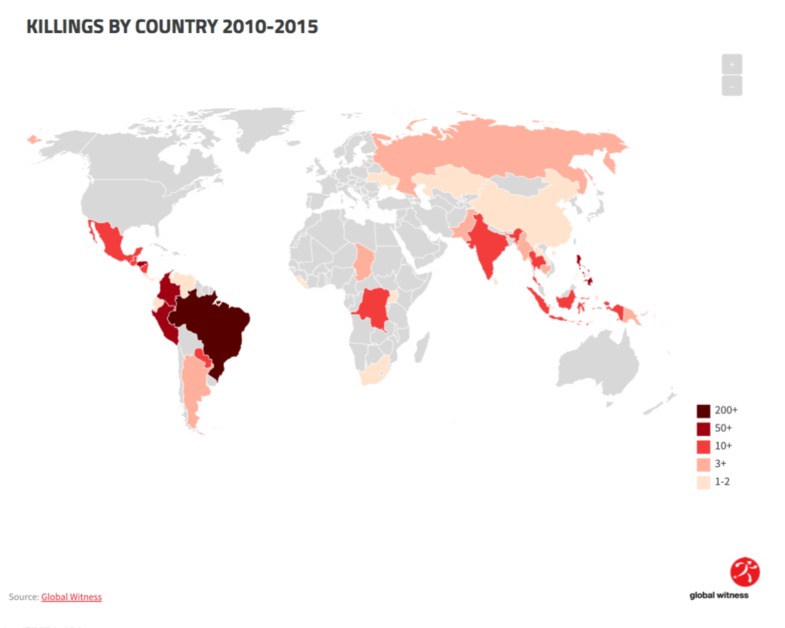Report: 2015 was deadliest for environmental activism
At least 185 activists killed worldwide, making it the highest recorded death toll, UK watchdog says in its report.

With more than three people killed every week, 2015 was the deadliest year for environmental and land activists, according to a new study.
Global Witness said there were 185 reported deaths across 16 countries, making it the highest recorded death toll of environmental activists in a single year.
Keep reading
list of 4 items‘Yemen at a crossroads’: Nearly 200 aid groups issue urgent funding appeal
Baby girl rescued from mother’s womb dies
How can we reduce global food insecurity?
According to the report published on Monday by the UK-based watchdog, fatal attacks increased by nearly 60 percent over the previous year.
“Go prepare your tomb,” are the kind of death threats Lottie Cunningham has received. “My colleagues were told to buy black suits because I was going to die,” said Cunningham, a lawyer who advocates for the rights of indigenous communities in Nicaragua and their threatened territories.
“Leaders defending their land and young people have died,” said Cunningham. “[Others] lose their arms, lose their legs. They are hunted.”
The countries with the most deaths are Brazil and the Philippines, with 50 and 33 deaths respectively.
Forty percent of environmental and land defenders killed were indigenous, according to the report. The number might be higher since indigenous victims are under-reported, Global Witness said.
Brazil’s Fundao dam collapse: The silence after the mud
Smaller communities are completely displaced as their land is cleared for whatever developments are planned, according to the UK-based watchdog.
The main industries threatening environmentalists’ lives are mining, logging and agricultural businesses.
In one incident, activists in Peru launched a protest against a Chinese-run mining company. Police opened fire on the protesters, killing four of them and injuring 15 others.
Raimundo dos Santos Rodrigues was a Brazilian activist who worked to defend the Gurupi reserve in the Amazon rainforest from illegal logging. He also pushed for the rights of local farmers and indigenous groups.
Last year, two unidentified men ambushed and attacked Rodrigues and his wife. He died as a result of his injuries. Members of his community fled their lands after the attack and now live in destitution, said the report.
Global Witness highlights that corrupt authorities facilitate the environmental degradation these companies cause.
“[Governments] need to tackle the root causes of the violence: lack of formal land rights and corruption that ensures these projects get the green light in the first place,” Billy Kyte, the Global Witness campaign leader, said.
 |
Cunningham was part of a group that filed a case with the Inter-American Commission on Human Rights. They received a mandate urging the Nicaraguan government to step in and protect the indigenous groups threatened. However, nothing changed for the communities.
“People come in with papers saying they bought the land, but this is a lie because it is illegal to sell indigenous reserves,” Cunningham said.
Foreign companies that come in to mine or start agricultural businesses are not involved in the conflict, even though they displace communities, explained Cunningham.
The Choctaw v climate change: ‘The earth is speaking’
Filipino activist Michelle Campos’ father and grandfather were killed by an armed group. Campos’ grandfather was the leader of an organisation campaigning against mining companies exploiting the mineral-rich land of Mindanao, Philippines.
Twenty-two activists from the Lumad people in Mindanao were killed last year, which makes the area one of the deadliest for environmental activists.
“We get threatened, vilified and killed for standing up to the mining companies on our land and the paramilitaries that protect them,” Campos, who belongs to the Lumad indigenous community, told Global Witness.
Around 97 percent of the mining industry in the Philippines is controlled by foreign companies from countries such as the United States, Canada, China and Japan.